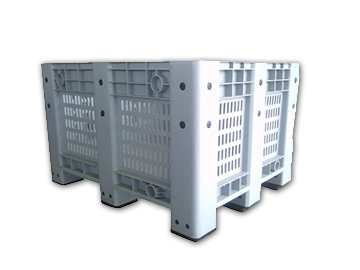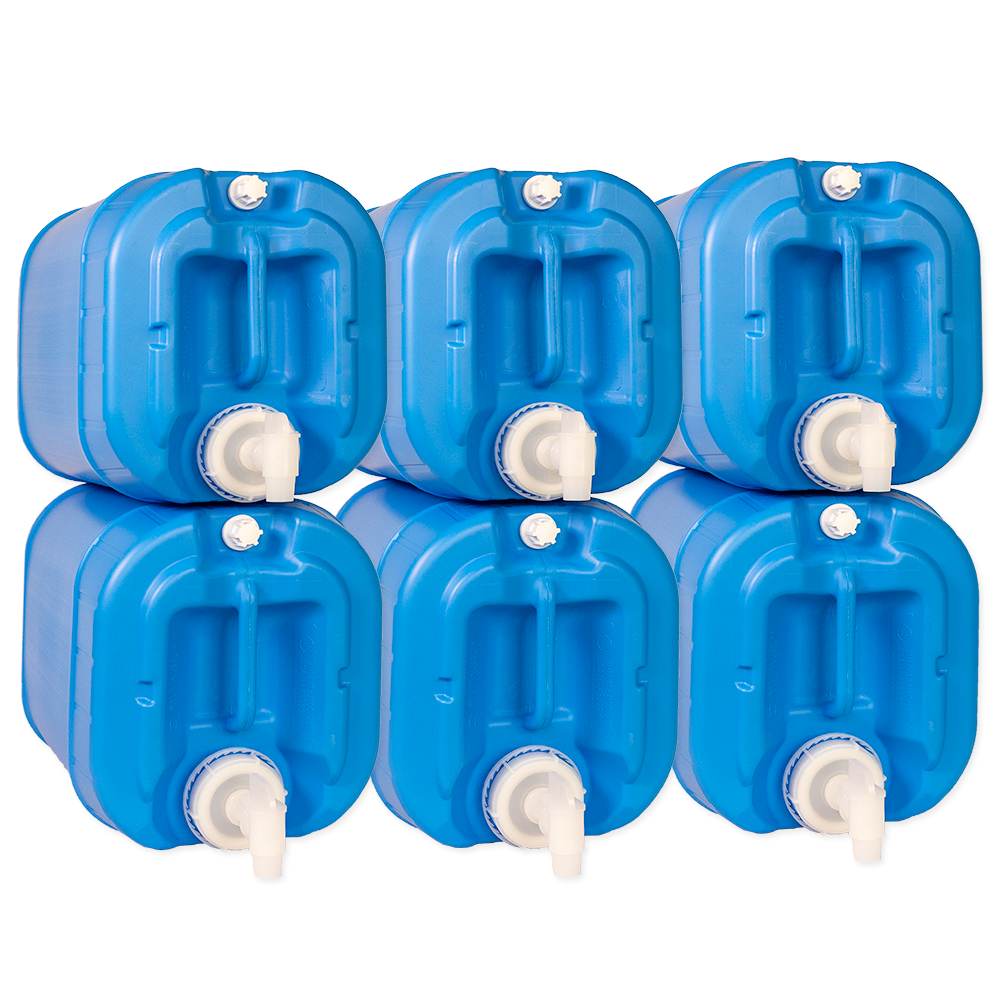The Duty of Mass Plastic Containers in Effective Recycling Practices and Sustainability
Mass plastic containers are important to modern-day reusing initiatives. Their style enhances the performance of material collection and transport, contributing to sustainability goals. These containers not only maximize area however likewise assist in keeping an eye on contamination levels. Nevertheless, their application is not without difficulties. Comprehending the full extent of their effect reveals an intricate relationship between logistics and ecological obligation that warrants additional exploration.
Understanding Mass Plastic Containers
Mass plastic containers function as an important part in various sectors, promoting the storage and transport of items. These containers are generally made from durable products such as high-density polyethylene (HDPE) or polypropylene, which offer toughness and resistance to ecological aspects. Their layout often includes attributes like stackability and modularity, enabling effective usage of space during both storage and transportation.
Industries such as farming, food processing, and producing often use mass plastic containers due to their lightweight nature and ease of handling. The containers come in numerous sizes and setups, providing to the particular needs of various products. Their convenience extends beyond mere functionality; they can likewise be personalized with covers, handles, and classifying choices to improve use - bulk plastic containers for sale. Consequently, bulk plastic containers play an essential duty in maximizing logistics and supply chain procedures across numerous fields, thereby adding to overall effectiveness and cost-effectiveness
Benefits of Using Mass Plastic Containers in Recycling
When organizations focus on reusing initiatives, the usage of bulk plastic containers considerably improves the effectiveness of the process. These containers are developed to optimize area, enabling for the storage space and transportation of larger quantities of recyclable products. This leads to fewer journeys to recycling facilities, thus decreasing fuel usage and connected exhausts.
Additionally, mass plastic containers are long lasting and resistant to different ecological elements, making certain that products stay safeguarded during handling and transit. Their light-weight design even more contributes to reduce transport expenses.
Additionally, the harmony of these containers promotes better sorting and processing of recyclable materials, which can improve total recycling rates - Bulk Plastic Containers. Organizations that take on bulk plastic containers also demonstrate a dedication to sustainability, favorably influencing their brand image. Inevitably, these benefits not only enhance recycling techniques however likewise add to broader environmental objectives
Just How Bulk Plastic Containers Facilitate Material Collection
Effective product collection is substantially enhanced by the usage of bulk plastic containers, as they supply a organized and reliable service for collecting recyclable products. These containers are made to fit big quantities of products, which simplifies the sorting and storage process. Their stackable layout makes best use of space application, making it less complicated for centers to organize recyclables without clutter.
On top of that, bulk plastic containers are weather-resistant and durable, enabling for outdoor positioning without destruction. This durability assures that products remain secured until they are accumulated for processing.

The uniformity in shapes and size of these containers facilitates standardization across collection points, allowing better monitoring of recyclable quantities. Additionally, their transparent nature permits very easy visibility of components, assisting in the monitoring of contamination degrees and assuring that only ideal materials are gathered. Generally, mass plastic containers play an essential role in simplifying the material collection procedure, therefore promoting effective reusing practices.
Transport Effectiveness and Environmental Influence
Transport performance plays a crucial role in the recycling process, specifically with the optimization of lots ability in mass plastic containers. By maximizing the quantity of material delivered, firms can substantially reduce the number of journeys needed, thus minimizing their carbon impact. This strategy not just improves functional performance but likewise contributes to a lot more lasting environmental methods.

Optimizing Tons Capability
Maximizing load capability is frequently ignored, it plays an essential role in improving transportation performance and reducing environmental impact in recycling practices. By optimizing the quantity that mass plastic containers can hold, reusing operations can reduce the variety of journeys needed for transport. This not only lowers fuel consumption however also decreases the wear and tear on automobiles. Efficient load monitoring allows centers to make use of space properly, making certain that each transport cycle is as productive as feasible. Additionally, well-optimized loads can lead to far better settlements with logistics providers, possibly lowering general costs. Inevitably, boosting tons ability adds to a more lasting reusing system by promoting efficient source usage and reducing waste produced throughout transportation.
Reducing Carbon Footprint
As recycling operations venture to minimize their environmental impact, reducing the carbon impact connected with transportation emerges as an essential goal. Mass plastic containers play an important duty in accomplishing this purpose by improving load efficiency and enhancing logistics. Their lightweight yet resilient layout enables optimum freight space application, decreasing the number of journeys required to carry products. By combining shipments, recycling centers can decrease fuel usage and greenhouse gas exhausts. Furthermore, strategically locating recycling facilities minimizes transportation distances, additionally lowering carbon results. Using fuel-efficient cars and alternate energy sources boosts overall sustainability. By incorporating these practices, the recycling sector can considerably reduce its carbon footprint, adding to an extra sustainable future.
Obstacles in making use of Mass Plastic Containers

Contamination Problems
Contamination concerns represent a considerable obstacle in the effective use mass plastic containers within reusing techniques. These containers often collect residues from previous components, bring about mixed products that can impede the recycling process. Impurities such as food waste, chemicals, or non-recyclable materials can jeopardize the stability of the entire set, click to investigate resulting in raised disposal prices and decreased reusing rates. In addition, incorrect cleaning or sorting can worsen these concerns, making it challenging for reusing facilities to refine products successfully. The existence of contaminants not just impacts the quality of recycled products but also weakens the general sustainability efforts focused on minimizing plastic waste. Attending to these contamination obstacles is essential for improving the effectiveness of mass plastic container recycling.
Recycling Infrastructure Limitations
Inefficiency in reusing infrastructure positions significant challenges for the effective management of bulk plastic containers. Many recycling centers lack the capability to refine big volumes of these containers efficiently, causing boosted costs and hold-ups. Furthermore, insufficient sorting technologies commonly bring about contamination, as mass containers might be blended with other materials, making complex the recycling procedure. Limited transport alternatives also impede the motion of mass plastic view it now containers to ideal reusing facilities, bring about boosted garbage dump waste. Furthermore, a lack of standardized protocols for mass container recycling develops complication amongst consumers and organizations, even more complicating initiatives to promote sustainability. Resolving these infrastructure constraints is vital to improve recycling practices and take full advantage of the potential of mass plastic containers in a round economic climate.
Ideal Practices for Applying Mass Plastic Containers
They must prioritize a calculated method that boosts efficiency and reduces contamination risks when companies consider executing mass plastic containers in their reusing practices. Initially, selecting the proper container size and kind is important to accommodate the quantity of materials being refined. Organizations ought to likewise develop clear labeling and signs to lead customers on proper disposal methods, minimizing complication and errors. Routine training sessions for team can even more strengthen these techniques, ensuring everybody comprehends their functions in preserving recycling stability.
In addition, organizations must apply a routine maintenance routine to inspect and clean containers, stopping the buildup of impurities. Partnering with neighborhood recycling facilities can additionally streamline the collection procedure, making sure that products are successfully processed. Finally, companies need to check and examine their recycling metrics, utilizing this data to fine-tune methods gradually and promote constant enhancement in their sustainability efforts.
The Future of Mass Plastic Containers in Sustainable Practices
As companies significantly focus on sustainability, the role of bulk plastic containers in recycling practices is set to advance substantially. Developments in products science are resulting in the growth of naturally degradable and recyclable options, enhancing the environmental advantages of mass plastic containers. In addition, the application of closed-loop systems will permit simpler collection and repurposing of these containers, lowering waste and source consumption.
Technical developments, such as smart radar, will make it possible for firms to keep track of the lifecycle of mass containers, boosting performance in recycling processes. As consumer need for lasting techniques grows, organizations will likely embrace mass plastic containers created for reuse and long-lasting worth. reference Moreover, partnership between governments and markets will promote the facility of standardized reusing protocols, guaranteeing that mass containers are properly incorporated into wider sustainability campaigns. Overall, the future of bulk plastic containers shows up promising, with substantial potential for contributing to a round economic situation.
Often Asked Concerns
How Are Bulk Plastic Containers Made and What Materials Are Used?
Mass plastic containers are typically made from high-density polyethylene (HDPE) or polypropylene (PP) These products are refined with injection molding or impact molding strategies, leading to durable, light-weight containers ideal for different storage and transportation requirements.
Can Mass Plastic Containers Be Recycled Several Times Prior To Recycling?
Yes, bulk plastic containers can be recycled several times prior to reusing. Their durability and design enable repeated use in numerous applications, advertising sustainability and resource efficiency while decreasing the requirement for new containers.

What Certifications Exist for Mass Plastic Containers in Recycling?
Numerous certifications for mass plastic containers include the Recycling Collaboration's certification, the Cradle to Cradle Certified ™ criterion, and the Lasting Packaging Union's standards, making certain containers fulfill particular environmental and recyclability standards for effective recycling.
Exactly How Do Bulk Plastic Containers Compare to Various Other Recycling Storage Options?
Mass plastic containers use better longevity and capability compared to various other reusing storage choices, reducing the risk of contamination and facilitating effective transportation. Their design sustains much better organization, enhancing total efficiency in recycling operations.
What Is the Life-span of a Mass Plastic Container in Recycling Processes?
The life expectancy of a mass plastic container in recycling procedures commonly ranges from 5 to 10 years, depending upon use, worldly top quality, and environmental problems, allowing for several cycles of usage prior to ultimate disposal or recycling.
When companies prioritize recycling initiatives, the utilization of mass plastic containers greatly improves the effectiveness of the process. Transport efficiency plays an important duty in the reusing process, particularly with the optimization of load capacity in bulk plastic containers. The use of mass plastic containers in recycling methods deals with substantial obstacles, specifically worrying contamination problems and restrictions within reusing facilities. Contamination concerns stand for a substantial obstacle in the effective usage of bulk plastic containers within recycling practices. When organizations think about executing bulk plastic containers in their recycling practices, they should prioritize a calculated strategy that improves performance and decreases contamination threats.